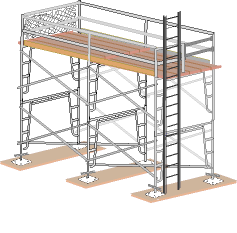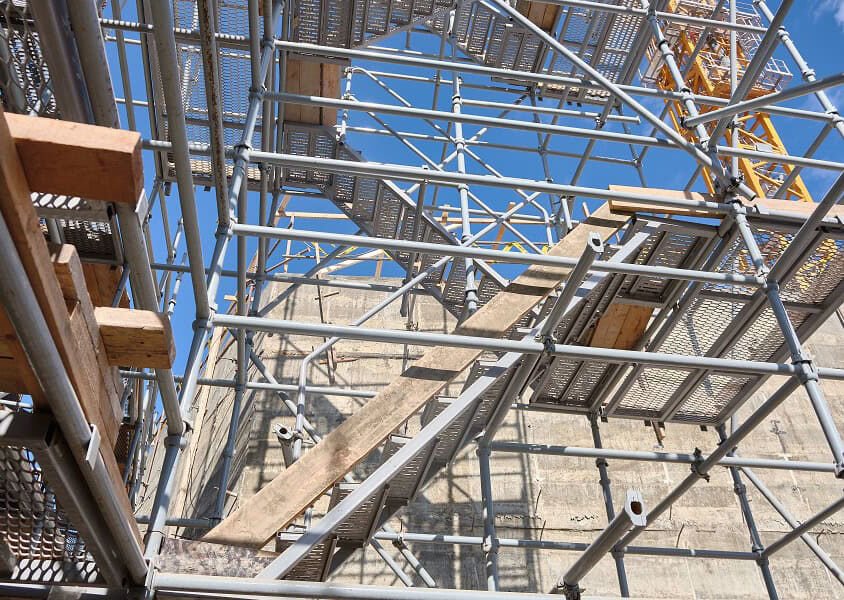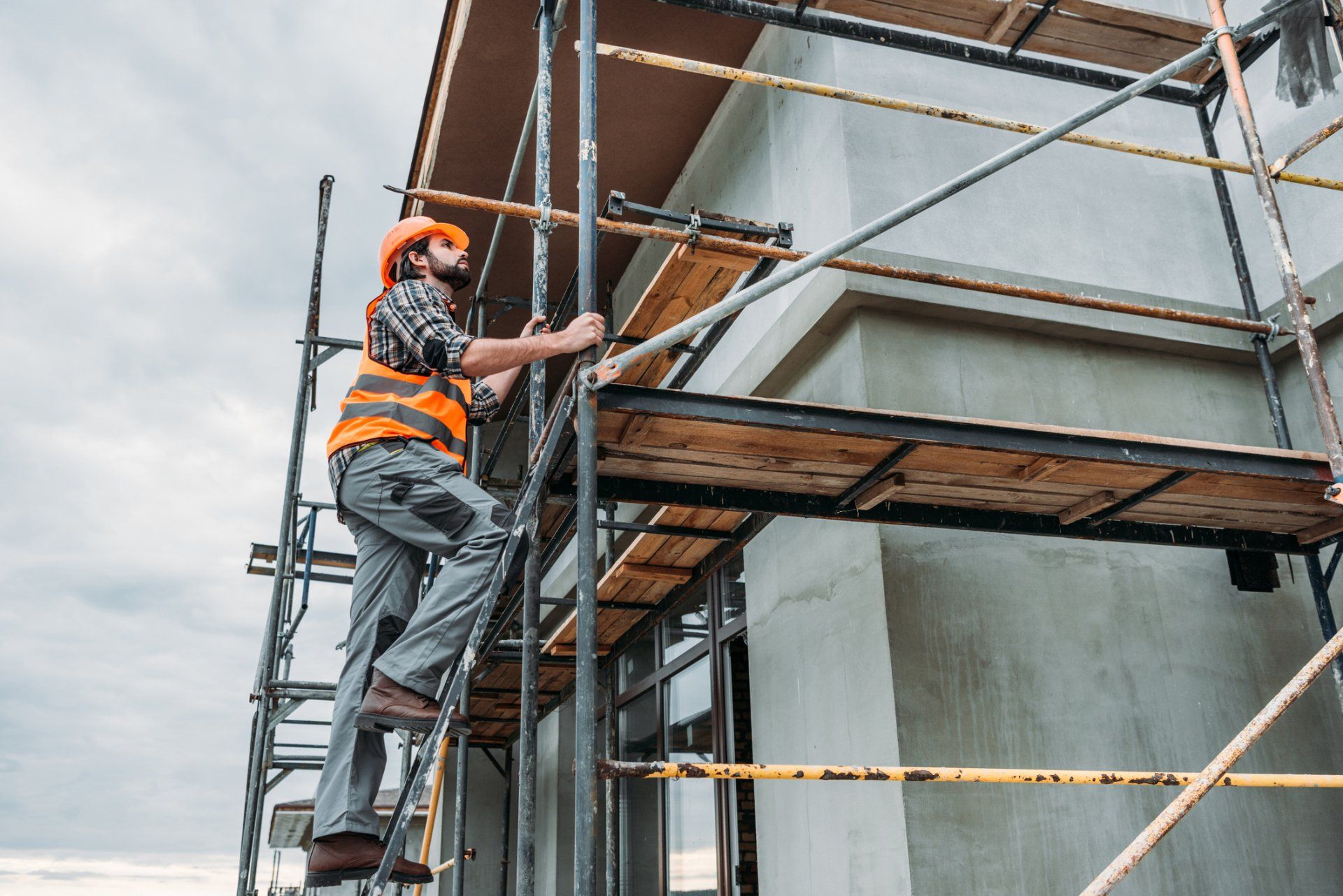Safe and Durable Scaffolding Guildford for Your Upcoming Construction Work
Safe and Durable Scaffolding Guildford for Your Upcoming Construction Work
Blog Article
Checking Out the Various Sorts Of Scaffolding Utilized in Building Projects
The building and construction industry counts greatly on different types of scaffolding to fulfill particular project requirements, each offering distinctive benefits and applications. Conventional structure scaffolding supplies a sturdy structure for basic tasks, while put on hold scaffolding is essential for work on high-rise frameworks.

Typical Frame Scaffolding
Typical frame scaffolding is just one of the most extensively made use of techniques in the construction sector due to its robustness and adaptability. This system includes upright and straight frameworks that are constructed to create a stable system for employees and products. The main parts include vertical articles, horizontal ledgers, and angled dental braces, which with each other supply a strong framework that can sustain substantial lots.
One of the key benefits of typical frame scaffolding is its versatility to different building and construction jobs, varying from property buildings to big commercial structures. The modular layout permits simple assembly and disassembly, making it effective for both lasting and short-term projects. Additionally, the system can be personalized in height and width, accommodating various building designs and website conditions.
Safety and security is paramount in scaffolding applications, and typical structure systems are furnished with guardrails and toe boards to stop drops and make sure worker defense. Furthermore, normal assessments and adherence to safety laws are important in keeping the stability of the scaffold. On the whole, typical frame scaffolding continues to be a basic selection in the building and construction industry, offering a trustworthy system for labor and boosting overall project efficiency

Suspended Scaffolding
Suspended scaffolding offers an unique solution for building tasks that call for access to elevated surface areas, particularly in situations where typical framework scaffolding might be not practical. This kind of scaffolding is typically put on hold from the roof covering or upper degrees of a framework, using a system of ropes, pulleys, and platforms to create a working room that can be adapted to various heights.
One of the main advantages of suspended scaffolding is its flexibility. It can be quickly rearranged or reduced to suit changes in building needs, making it excellent for jobs such as window installment, frontage work, and maintenance on skyscrapers. Furthermore, the minimal impact of suspended scaffolding permits much better use ground room in metropolitan atmospheres, where space is often minimal.
Security is a vital factor to consider in using put on hold scaffolding. Appropriate rigging and securing systems have to be utilized to ensure security and protect against crashes. Operators should likewise be educated in the secure use of this devices. Overall, put on hold scaffolding gives a effective and effective service for accessing hard-to-reach areas in numerous building and construction circumstances, enhancing both productivity and safety and security on website.
System Scaffolding
System scaffolding, commonly considered a contemporary remedy in the scaffolding sector, contains pre-engineered parts that can be rapidly put together and adapted for numerous building and construction projects. Scaffolding. This kind of scaffolding is defined by its modular layout, which permits flexibility and performance on task websites, fitting architectural needs and various heights
Typically made from high-strength steel scaffold erecting or light weight aluminum, system scaffolding provides boosted sturdiness and stability. The elements include vertical messages, straight journals, and angled dental braces, which adjoin safely, ensuring a robust structure. The style often includes standardized installations, simplifying assembly and disassembly procedures, therefore reducing labor time and costs.

Rolling Scaffolding
Moving scaffolding is a versatile choice to typical set scaffolding, created for wheelchair and simplicity of usage on construction websites. This kind of scaffolding includes a platform sustained by structures with wheels, this permitting employees to quickly relocate it as required. The mobility attribute dramatically enhances performance, as it decreases downtime associated with setting up and dismantling taken care of scaffolding.
Typically constructed from light-weight materials such as light weight aluminum or steel, rolling scaffolding offers a tough yet portable remedy for tasks needing regular repositioning - Scaffolding. It is especially beneficial in tasks such as painting, drywall installment, and electric work, where access to numerous elevations and places is required
Safety is paramount in rolling scaffolding design, with features such as securing wheels to avoid unplanned movement when in usage, and guardrails to secure workers from drops. In addition, many models are adjustable in elevation, suiting numerous job needs.
Cantilever Scaffolding

The layout of cantilever scaffolding normally involves making use of braces or arms anchored to a building or framework, enabling the platform to expand external safely. Safety and security is vital; hence, these scaffolds should be crafted to endure ecological problems and numerous lots. Routine evaluation and maintenance are necessary to make sure structural honesty and worker safety.
Cantilever scaffolding is preferred for its convenience and reliable use room, making it a preferred choice in city environments where space restraints are typical. It helps with less complicated access to high elevations, ultimately adding to the total efficiency of construction tasks. Similar to all scaffolding types, visit this site proper training and adherence to security standards are vital for workers making use of cantilever scaffolding.
Final Thought
To conclude, the diverse types of scaffolding utilized in construction projects each serve unique functions customized to details site demands. Typical frame scaffolding offers stability, while put on hold scaffolding provides convenience for elevated jobs. System scaffolding facilitates quick setting up, and rolling scaffolding boosts wheelchair for varying workplace. Cantilever scaffolding properly attends to challenges in metropolitan settings. Comprehending these scaffolding types is necessary for optimizing safety and productivity in building and construction, inevitably adding to the effective conclusion of jobs.
Traditional framework scaffolding gives a sturdy structure for basic jobs, while put on hold scaffolding is vital for work on skyscraper frameworks.Moving scaffolding is a functional alternative to traditional set scaffolding, developed for movement and convenience of usage on building and construction websites. As with all scaffolding kinds, proper training and adherence to security requirements are critical for workers using cantilever scaffolding.
Typical frame scaffolding provides security, while put on hold scaffolding offers convenience for raised jobs. System scaffolding assists in quick assembly, and rolling scaffolding enhances flexibility for differing job settings.
Report this page